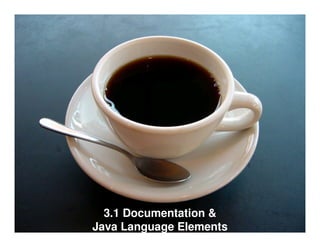
Chapter3 bag2
- 1. 3.1 Documentation & Java Language Elements
- 2. 3.1.1 Purpose of documentation • Assist the programmer with developing the program • Assist other programers who wish to use or modify the program
- 3. 3.1.2 Guidelines for documenting classes • Block comments – Start with /* and end with */. Can occupy multiple lines • Single line comments – The line starts with //
- 4. 3.1.3 The javadoc parameters • The javadoc program can create HTML documents from the comments in the program’s source file • To create javadoc comments, use /** and */ • Special tags can be imbedded in the comments @author, @version, @param, @return, etc
- 5. 3.1.4 Java API documentation
- 6. 3.1.5 Generating API docs for classes using the javadoc tool
- 7. 3.2.2 Keywords • Keywords form the Java vocabulary • The compiler is case-sensitive
- 8. 3.2.3 Identifiers • Labels assigned to data or storage addresses • Rules for identifiers: – Any alphabetic character – First character must be a letter – Cannot contain space, % or # – Cannot be keywords
- 9. 3.2.4 Use of braces, semicolons, commas, and white space • A block is a collection of statements bounded by braces { } • A statement consists of one or more lines of code, followed by a semicolon ; • Commas are used to delineate data • Whitespace is used to separate keywords and identifiers
- 10. 3.3.1 Data storage introduction • Registers – Memory in the CPU • The Stack – Memory for methods and local variables • The Heap – Memory to store objects • Static – Stores data that will not change during the life of the program • Constant – Values that never change.
- 11. 3.4.1 Java language types • Data type is the classification of forms of information • Data type is declared using keywords • Java is strongly typed
- 12. 3.4.2 Java primitives • boolean – true or false • char – Stores a single UNICODE character • byte – Signed whole numbers from -127 to +128 • short – Signed whole numbers from -32,768 to +32,767 • int - Signed whole numbers from -231 to 231 -1 • long – Signed whole numbers from -9x1018 to 9x1018 -1 • float – Decimal values up to 6 – 7 decimal places • double – Decimal values up to 14 – 15 decimal places
- 13. 3.4.3 Java references • Objects are created in heap memory • Programs use a variable that references the object • The program acts on the object by using the reference
- 14. 3.4.4 Data • Object Data – Instance of a class, stored on the heap • Static Class Data – Available before the object is created • Local Data – Exists in methods, stored on the stack • Constants – Data that will not change • Variables – Holds a primitive or a reference to an object
- 15. 3.4.4 Data (example) public class Student { private final String studentName; public static final int courseNumber = 12345; public String grade; public Student(String name, String grd) { studentName = name; grade = grd; } public void changeGrade(String grd) { grade = grd; } Try to Identify!!!!! public String getName() { 1. Object Data/Variable return studentName; 2. Static Data/Variable } } 3. Local Data/Variable 4. Constants
- 16. 3.5.2 Elements • Class – Template or blueprint for object creation • Method – A block of statements that control an object’s behavior • Constructor – A special method that is called when the object is created • Modifiers – private, public, protected, default, static, final
- 17. 3.5.2 Elements public class Student { private final String studentName; public static final int courseNumber = 12345; public String grade; public Student(String name, String grd) { studentName = name; constructor grade = grd; class } public void changeGrade(String grd) { grade = grd; method } public String getName() { return studentName; } }
- 18. 3.6.1 Five steps of object creation • Declaration of a reference variable • Default initialization • Explicit initialization • Execution of the constructor • Assignment of object’s address to reference variable
- 19. 3.6.3 Mutability, Garbage Collection & Finalizers • Most data is mutable, and can be changed. To make it immutable, use the final keyword • Garbage collection frees up memory occupied by unused objects. This process cannot be controlled • Every object inherits a finalizer method, that will be executed when the object is released
- 20. Individual activity & Lab Work • Possible Lab Schedule every: – Monday, 15.00-16.50 or – Friday, 14.30 - 15.20 (PUSKOM-FTUI) • TODO LIST (finished before next session): – Read through the online curriculum – Take the module exam 1 – 3 (Start: Thursday) – Do LABs: • 3.1.6.1 Insert Documentation for Classes in the JBANK Application • 3.1.6.2 Generate API Docs for JBANK Classes with the javadoc Tool • 3.5.1 Define Variables • 3.5.9 Apply Access Modifiers • 3.6.1 Use of Constructors • 3.8.1 Create the Classes for Phase I of the JBANK Application Note: Red bold color is obligatory to be submitted to ECourse System!
